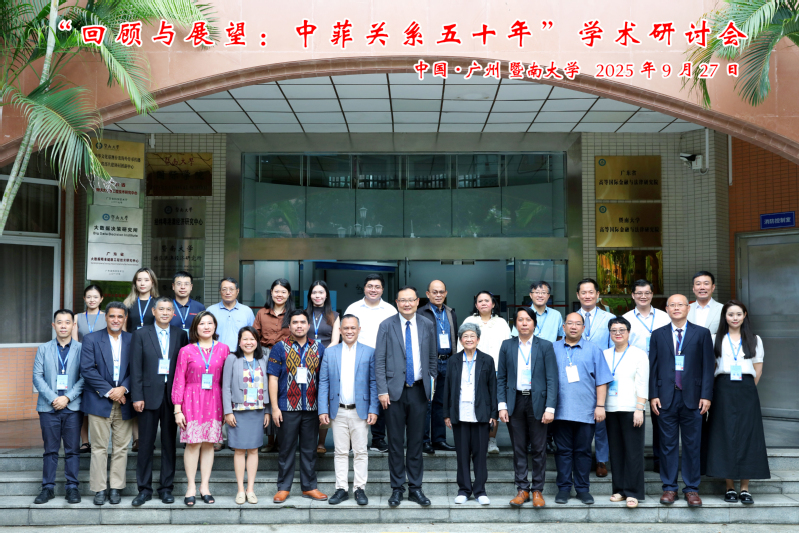- ABOUT JNU
- ADMISSION
-
ACADEMICS
- Schools and Colleges
-
Departments and Programs
- Arts College of
- Chinese Language and Culture College of
- Economics College of
- Electrical and Information Engineering College of
- Foreign Studies College of
- Information Science and Technology College of
- Environment School of
- Humanities School of
- International Business School
- International Studies School of
- Journalism and Communication College of
- Law School
- Liberal Arts College of
- Life Science and Technology College of
- Management School of
- Marxism School of
- Medicine School of
- Pharmacy College of
- Physical Education School of
- Science and Engineering College of
- Shenzhen Tourism College
- Research Institute
- Research Center
- Programs in English
- Majors
- Study Abroad
- Online Learning
- RESEARCH
- CAMPUS LIFE
- JOIN US
Latest News
Jinan University Hosts Academic Seminar "Review and Prospect: Fifty Years of China-Philippines Relations"
Date: October 9, 2025
Author: ZHAO Shuning
Editor: LI Weimiao
Source: Jinan University Integrated Media Center
Jinan University hosted the academic seminar "Review and Prospect: Fifty Years of China-Philippines Relations" on September 27, 2025, marking the 50th anniversary of the establishment of diplomatic ties between China and the Philippines. The event was co-organized by the Center for Philippine Studies at Jinan University, the Chinese Studies Program of Ateneo de Manila University, the Philippine Association for Chinese Studies, and the Philippines-China Research Center of De La Salle University–Dasmariñas. Nearly twenty leading scholars and experts from both countries engaged in in-depth discussions on the historical evolution, current challenges, and future prospects of bilateral relations.
In his opening address, Professor ZHANG Xiaoxin, Vice President of Jinan University, emphasized that the Philippines is an important neighbor and partner to China. He underscored the academic community’s responsibility to enhance mutual understanding between the two nations through strengthened research and scholarly exchanges on the Philippines.
The seminar was structured into four panel sessions focusing on politics, economy, culture and history, and South China Sea and security issues. Participants examined a wide range of topics, including challenges in bilateral relations, the Philippines’ China policy, Chinese investments in the Philippines, prospects for economic cooperation, China’s image among Filipinos, the Chinese community in the Philippines, and issues related to the South China Sea.
Ms. Teresita Ang See of the Philippine Chinese Cultural Heritage Center expressed concerns over the potential impact of the online gaming industry on the local Chinese community and China-Philippines relations. Professor Andrea Chloe Wong-Jung from Cavite State University systematically analyzed the evolution of Philippine China policy across four administrations—from Arroyo to Marcos Jr.—identifying five key influencing factors: the president’s political background, perception of China as a threat, prioritization of national interests, stance on the U.S.-Philippines alliance, and the broader geopolitical context. Dr. Jane Yugioksing of Ateneo de Manila University presented her research on Filipino perceptions of China, noting that despite tensions over the South China Sea, many Filipinos still view China positively in areas such as poverty reduction, cuisine, technology, and popular culture—with younger generations showing particularly open attitudes.
The seminar also featured Mr. ZHANG Hongbo, a Chinese entrepreneur with over a decade of investment experience in the Philippines. He shared practical insights and cautionary advice, noting that geopolitical uncertainties, frequent local political changes, corruption, and resistance from domestic interest groups have led to significant losses for some Chinese investors. He proposed five strategic recommendations: timing investments with periods of stable bilateral relations; selecting regions with stable local governance; opting for economic zones or industrial parks to minimize bureaucratic hurdles; ensuring projects can be completed within a single local administration term; and partnering with established local enterprises to mitigate operational challenges.
Professor Rommel Banlaoi, a prominent scholar, reviewed China-Philippines cooperation under the framework of the Declaration on the Conduct of Parties in the South China Sea. He highlighted the significance of bilateral consultation mechanisms in areas such as fisheries and marine scientific research. While acknowledging current tensions, he expressed optimism that these challenges could pave the way for renewed and closer cooperation in the near future.
During the closing session, scholars unanimously emphasized the importance of deepening people-to-people exchanges and strengthening nongovernmental diplomacy as a foundation for sustainable bilateral relations. Academic exchanges were recognized as a vital bridge for enhancing mutual understanding. Participants also noted that Guangdong Province, with its economic strength and geographical advantages, is well-positioned to play a more active role in promoting China-Philippines engagement.

(Group photo of participants)
NEWS
- About the University
- Quick Links
Copyright © 2016 Jinan University. All Rights Reserved.




